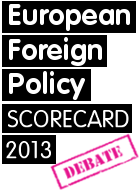Does size matter? Small states and EU foreign policy
The efforts of smaller states in 2012 give reason to hope that over time, the power that lies in the EU’s diversity could be unlocked and used to make the EU's foreign policy more effective.
 It is always the big states that make the headlines in EU policy making. The start of 2013 has been no different on this front, from Germany’s austerity drive; to France’s intervention in Mali or Britain’s announcement of a likely referendum on its membership of the EU.
It is always the big states that make the headlines in EU policy making. The start of 2013 has been no different on this front, from Germany’s austerity drive; to France’s intervention in Mali or Britain’s announcement of a likely referendum on its membership of the EU.
Reading the reports from last week’s summit meeting on the EU budget, one could be forgiven for thinking that there were only three states that matter in EU decision making.
However, in foreign policy, the story behind the headline is increasingly the small states.
The European Council for Foreign Relations' (ECFR) European foreign policy scorecard tracks all the contributions – from EU institutions and the member states – that contribute to the impact of European foreign policy.
Amid a general trend which Scorecard 2013 shows towards member states co-operating on EU foreign policy (in 2012 there was a significant drop in the number of countries rated as slackers on specific policy questions, particularly starkly in the cases of Cyprus, Italy and Poland) a strong story also emerges on the role that smaller states can play in leading initiatives.
While leadership from the big three notably dropped last year, interesting coalitions of smaller member states were instrumental in developing and championing foreign policy initiatives.
Although Germany, closely followed by the UK and France still came out at the front of the pack in terms of the number of times they were categorised as leading on a foreign policy issue in 2012, the Franco-German motor was barely in evidence on foreign policy development, and the gap between the EU3 and smaller states had closed.
The unusual alliance of Denmark and Ireland was critical in pressing for a collective EU position on labelling of products exported from Israeli settlements, with the UK coming in behind them only once they had launched the idea.
Austria, Belgium, Estonia and Ireland were also critical leaders (alongside larger states such as Spain, Poland, Italy, France and Germany) in their contributions to Common Security and Defence Policy missions.
At the UN, EU support for an arms trade treaty was driven not only by France and the UK, but, significantly, Belgium, Bulgaria, Finland, Ireland and Sweden.
It is undoubtedly true that the EU’s multiplier effect is bigger for smaller states than large ones. Even if those in the UK who believe that London would not lose influence by moving outside the EU may be misguided, clearly this question would never even arise in Lisbon, Sofia or in Tallinn.
So the national dividend from an activist approach to driving EU foreign policy is arguably greater forsmaller states. Nevertheless, the EU as a whole benefits when one of its members drives a policy decision forward.
When Bulgarian Foreign Minister Mladenov spearheaded an idea for a small group of foreign ministers to represent EU foreign policy chief Catherine Ashton on visits to Lebanon, Iraq and the South Caucasus in 2012, the united front from ministers Mladenov, Bildt (Sweden) and Sikorsky (Poland) reflected positively on the EU as a collective, indicating a willingness to pool political resources.
And clearly the personal leadership makes a difference to the impact of what would otherwise have been just another mechanism in the EU’s technical foreign policy toolkit.
As the domestic debate over Mladenov’s activism in the Middle East and North Africa region following the terrorist attack in Burgas last year has shown, the commitment to the European collective effort does not come without a price tag at home, yet he has continued to press forward with it.
As the European External Action Service (EEAS) comes of age this year, and is subject to official review, it is clear that however far the new diplomatic service develops, it will only ever be as strong as the political investment that member states capitals allow it to be.
To date, this investment is a long way from enabling the EEAS to realise the full potential range of roles it could play and reconciling the technocratic, pre-Lisbon treaty Europe with the power Europe of the member states.
Still, the efforts of smaller states in 2012 give reason to hope that over time, the power that lies in the EU’s diversity could be unlocked and used to the good of Europe’s global impact.
The European Council on Foreign Relations does not take collective positions. ECFR publications only represent the views of their individual authors.


